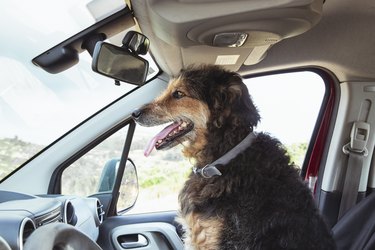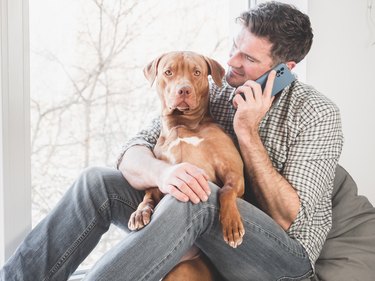Battery acid is hazardous to dogs because it is a corrosive material. If you believe your dog has ingested a battery or battery acid, seek immediate veterinary care. Your veterinarian will need to determine how much battery acid your pet has ingested, how ill your dog is as a result of the ingestion, and what the best treatment will be. The more you know about the dangers of batteries for dogs and the faster you obtain proper medical treatment for your dog, the better their chances will be for a successful recovery.

Video of the Day
Why batteries are dangerous for dogs
Battery acid can be ingested when your dog eats or chews on a battery. While this may sound like an unlikely occurrence, it can happen fairly easily if your dog decides to chew up an electronic gadget (such as a remote control, hearing aid, or even a musical greeting card), a toy, or other household items that contain batteries.
Video of the Day
When batteries are chewed or ingested, the acid is released and can cause serious health problems. Batteries commonly contain sodium hydroxide or potassium hydroxide, both commonly known as lye. These are extremely corrosive and will severely damage any tissue with which they come into contact. Tissue necrosis is a common side effect of battery acid ingestion and causes severe ulcers. Ingestion of a disc-shaped battery can also result in electric currents passing through your dog's system and can damage the mouth, stomach, esophagus, and intestines. Lithium batteries can cause significant tissue damage in as little as 15 to 30 minutes after being consumed.
Signs your dog ate a battery
The most commonly consumed batteries are alkaline dry cell batteries, such as AA and AAA household batteries, and small button batteries (disc-shaped batteries). The signs of battery acid poisoning can take up to 12 hours to appear. Do not use a lack of symptoms as a reason to delay getting your dog veterinary treatment if you believe they have consumed a battery.
Signs that your dog ate a battery include:
- Depression
- Excessive drooling or salivating
- Oral inflammation
- Oral ulceration
- Smacking lips
- Flicking tongue
- Pawing at the mouth
- Dysphagia (difficulty swallowing)
- Vomiting
- Abdominal pain
- Temperature in excess of 104 degrees
- Coughing
- Anorexia
- Intestinal ulceration and perforation

My dog ate a battery! Help!
What to do if your dog ate a battery
Do not attempt to induce vomiting in a dog who has ingested battery acid. The act of vomiting can cause more damage to your dog's mouth and esophagus as it brings the acid back up through your pet's digestive tract.
When you take your dog to the veterinarian, they will assess your pet's condition and immediate symptoms. They will look for oral ulcerations or black powdery material inside your dog's mouth. They might choose to flush out your dog's mouth for 15 to 20 minutes with tap water.
The veterinarian will likely perform X-rays to see if the battery is still inside your dog and where it is. If necessary, they may perform immediate surgery to remove the battery. If the battery is still in the stomach, your veterinarian might be able to retrieve it with endoscopy, which is less invasive than a surgical procedure. Aftercare might include a prescription for anti-ulcer medications and pain medication as well as a bland or high-fiber diet.

Will my dog die from eating a battery?
It is possible for a dog to die from eating a battery. If not treated promptly, battery ingestion can be fatal. Damage from the battery can start to manifest in less than one hour after a dog ingests it. This can include both tissue destruction in the gastrointestinal tract, and, if your dog ingested a disc battery, esophageal chemical burns.
The bottom line
If your dog swallows or chews any type of battery, it is a life-threatening emergency. Batteries are extremely corrosive and will damage any internal tissue they touch. There is no appropriate home first aid for a dog eating batteries. You should get your pet to a veterinarian right away. Do not attempt to induce vomiting at home, as battery acid can do even more damage as it comes up. Your DVM will most likely perform radiographs to see where in the GI tract the battery is located inside your dog and perform either an endoscopy or surgery to retrieve the battery.